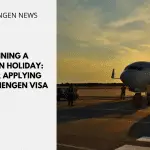How to Apply for an Iceland Schengen Visa for UK Residents
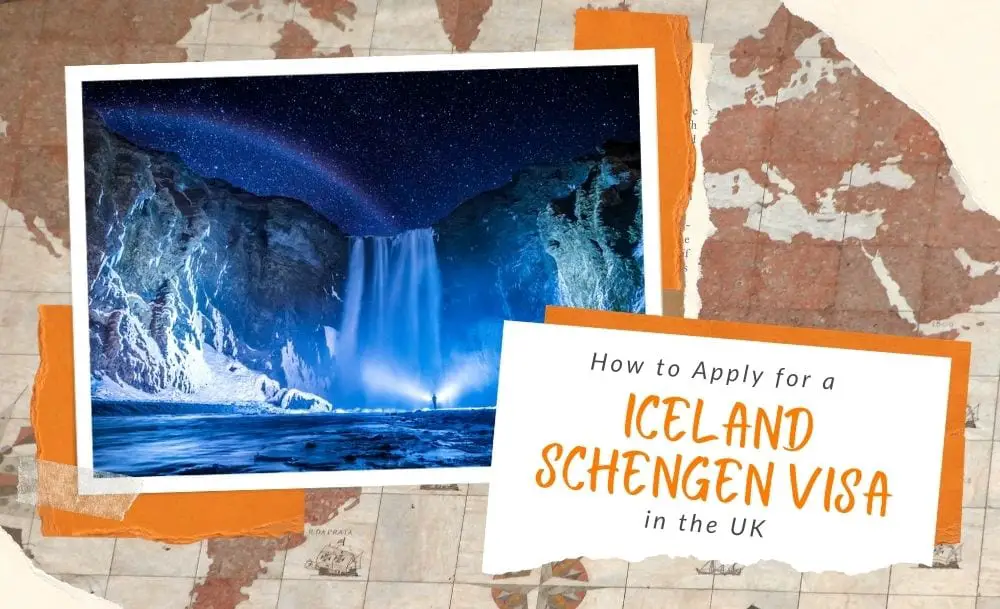
Iceland is a Schengen country of sharp contrasts. A small Nordic nation in the North Atlantic Ocean, where fire and ice co-exist. Where dark winters are offset by the summer’s midnight sun. A country where insular existence has spurred a rich and vibrant culture.

There’s a reason so many travellers are donning their ski jackets and bearing the cold. Tourists are drawn to Iceland because of its stunning natural beauty. The landscape is nothing short of mystical. The scenery promises an endless series of snow-covered volcanoes, mountains, and ice fields. With a rugged, “other-worldly” terrain, the Nordic icy views are like nothing you’ll see in the rest of the world.
Entry rules in response to Coronavirus

In early 2020, Iceland joined its Schengen country neighbours in closing its borders due to the COVID-19 pandemic. The country has since re-opened its borders to allow travel, but with restrictions that depend on your country of origin.
Iceland, like other Schengen countries, updates its restrictions regularly depending on the current situation so it’s best to check with the restrictions close to your travel date to know the updated measures and requirements before you travel.
Iceland adopts its own national classification of risk areas, hence travel restrictions for Iceland are not based on the common “EU Traffic Lights” map.
You should check on the latest news regarding restrictions, quarantine or whether a test will be required either from reliable news sources, the Icelandic government website, or the UK government website one to two weeks before your trip.
Who needs a visa to travel to Iceland?
Travelling to Iceland for EU/EEA Citizens
Iceland is a Schengen country, which allows for free movement between the 26 EU and EFTA states (Iceland, Norway, Liechtenstein, and Switzerland). A uniform Schengen visa issued by one of the Schengen states is valid for travel within the whole Schengen area. The Schengen visa should be applied at an Embassy representing the state where the main destination is within the Schengen area.
You need a visa to Iceland for business, personal or tourism purposes if you are:
- Not a citizen of a Nordic country
- Not a citizen of an EU/EAA country
- A citizen of a country listed on this page
Travelling to Iceland Post-Brexit for UK Citizens
The rules for travelling or working in European countries changed on 1 January 2021:
- you can travel to countries in the Schengen area for up to 90 days in any 180-day period without a visa as a tourist, to visit family or friends, to attend business meetings, cultural or sports events, or for short-term studies or training
- if you are travelling to Iceland and other Schengen countries without a visa, make sure your whole visit is within the 90-day limit. Visits to Schengen countries within the previous 180 days before you travel count towards your 90 days
- for long-stay visits, to work or study, for business or for other reasons, you will need to meet the Icelandic government’s entry requirements.
- if you stay in Iceland with a residence permit or long-stay visa, this does not count towards your 90-day visa-free limit
At Icelandic border control, you may need to use separate lanes from EU, EEA and Swiss citizens when queueing. Your passport may be stamped on entry and exit. You may also need to:
- show a return or onward ticket
- show you have enough money for your stay
There are separate requirements for those who are residents of Iceland. If you are resident in Iceland, you should carry proof of residence as well as your valid passport when you travel. You should also check your passport’s validity when you travel and renew it if you don’t have enough time on it. Your passport must be:
- valid for at least 3 months after the day you plan to leave Iceland or any other Schengen country
- less than 10 years old
Travelling to Iceland Post Brexit for Other Third Country Citizens
Citizens of the following countries residing in the UK and planning to visit Iceland are required to get an Icelandic Schengen visa in order to be able to enter Iceland.
| Afghanistan | Algeria | Angola |
| Armenia | Azerbaijan | Bahrain |
| Bangladesh | Belarus | Belize |
| Benin | Bhutan | Bolivia |
| Botswana | Burkina Faso | Burma/Myanmar |
| Burundi | Cambodia | Cameroon |
| Cape Verde | Central African Republic | Chad |
| China | Comoros | Congo |
| Cote D'iviore | Cuba |
| Dem. Rep. Of Congo | Djibouti | Dominican Republic |
| Ecuador | Egypt | Equatorial Guinea |
| Eritrea | Ethiopia | Fiji |
| Gabon | Gambia | Ghana |
| Guinea | Guinea-Bissau | Guyana |
| Haiti | India | Indonesia |
| Iran | Iraq |
| Jamaica | Jordan | Kazakhstan |
| Kenya | Kosova | Kuwait |
| Kyrgyzstan | Laos | Lebanon |
| Lesotho | Liberia | Libya |
| Madagascar | Malawi | Maldives |
| Mali | Mauritania | Mongolia |
| Morocco | Mozambique | Namibia |
| Nepal | Niger | Nigeria |
| North Korea | Northern Mariana's | Oman |
| Pakistan | Papua New Guinea | Philippines |
| Qatar | Russia | Rwanda |
| Sao Tome And Principe | Saudi Arabia | Senegal |
| Sierra Leone | Somalia | South Africa |
| Sri Lanka | Sudan | Suriname |
| Swaziland | Syria | Tajikistan |
| Tanzania | Thailand | Timor-Leste |
| Togo | Tonga | Tunisia |
| Turkey | Turkmenistan | Uganda |
| Uzbekistan |
| Vietnam | Yemen | Zambia |
| Zimbabwe |
How to Apply for a Visa to Iceland in the UK
If you are a British citizen, you do not need a visa for Iceland. However, citizens of these countries residing in the UK and planning to visit Iceland are required to get an Icelandic visa in order to be allowed in the country.
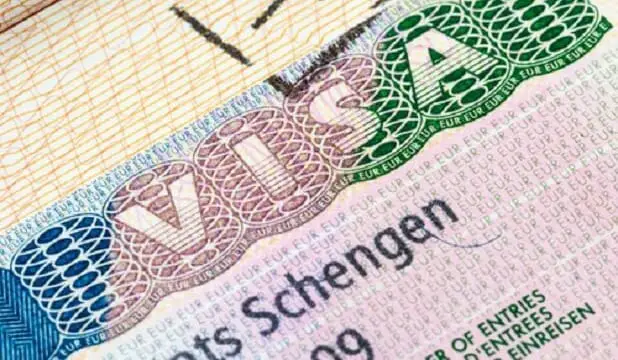
In order to apply for an Iceland visa in the United Kingdom, you must be able to prove that you have a legal right to remain in the UK. If not, you should apply for your visa from your home country. The main requirement is that you must have a UK residence permit valid for at least 90 more days following your departure date from Iceland or any other Schengen Area. You can extend your visa for 3 more months from within the UK if you have a 3 month UK visa in order to be eligible to apply for an Icelandic Schengen visa.
In the United Kingdom, Schengen visas for Iceland are arranged through the Embassy of Denmark. You should apply for an Iceland Schengen visa via the Danish Embassy/Consulate/VAC in the UK if:
- Iceland is the only Schengen country you plan on visiting
- Iceland is your main destination (the country you will be staying the longest in)
- Iceland is the first Schengen country you are visiting since you will be spending an equal amount of days in each Schengen country you plan visiting
In case you plan on staying in Iceland for more than 90 days you must apply for an Iceland residency permit, and not an Iceland Schengen visa.
Please, note that if you are not a resident in the United Kingdom you should apply at the Embassy/Consulate/VAC of Iceland in your country of residence.
What is the Schengen Visa Application Processing Time?
Visa application times may vary depending on where you submit your application.
- Visa applications usually take 15 calendar days to process, however, some applications may take 30 – 60 days to be processed.
- If you are submitting your application to the Manchester or Edinburgh office, you need to remember it will take an extra 3 – 4 working days for your application to be sent to the embassy for processing.
- Applications submitted in London usually arrive at the embassy the following day.
In addition, some nationals are subject to prior consultation in one or more Schengen countries, before a visa can be issued. The consultation might take around 8 – 10 days.
You should submit your application at least 3 months before your trip to avoid any processing delays.

Types of Iceland Schengen Visas Offered at the Embassy of Denmark in London
There are 2 types of visa that you can apply for and the one you need will depend on the duration of your trip and your reason for travelling to Iceland:
- Short-stay (Schengen) Visa – valid for up to 90 days (in a 180 day period) for the purposes of tourism, business, visiting family/friends, conference, EEA/EU national family member
- Long stay (Residence and work permits) Visa – you should apply for this kind of visa if you want to live in Iceland for more than 90 days for employment, family reunification, study, research, etc.
Easy Steps to Apply for Icelandic Schengen Visa from the UK
The embassy has outsourced visa applications to VFS Global in the UK, so you can submit your application to one of the VFS offices located in London, Manchester, or Edinburgh. Although you will submit your application to VFS Global, it is the embassy that processes it and makes the final decision about your visa.
You may have to wait several weeks for an appointment at VFS Global, so you should apply well in advance. You may apply up to 3 months ahead of your departure date.
Here are a few steps to help you apply for your Iceland Schengen visa.
Step 1: Make an appointment
Depending on the type of visa you are applying for, you may or may not need to make an appointment.
No appointment required for Iceland Schengen Visa Application
- Short-stay visas for business or EEA/EU national family member
- All residence and work permit categories (except family reunification)
Appointment required for Iceland Schengen visa application
Making appointments with the embassy or visa application centre is generally easy and you can do it yourself. However, If you are running short of time or not sure which consulate to apply to, or have no idea how to get this done yourself then not to worry, we will make the appointment for you for a small service fee!
When to apply for a Schengen Visa to Iceland?
The earliest you can file your Schengen visa application is at most 6 months before your intended trip. Whereas, the latest you can apply for your visa is 2 weeks prior to your trip to Iceland.
However, you are highly recommended to apply for a tourist visa at least 3 months before your travel date in order to avoid any processing delays.
Step 2: Complete your application
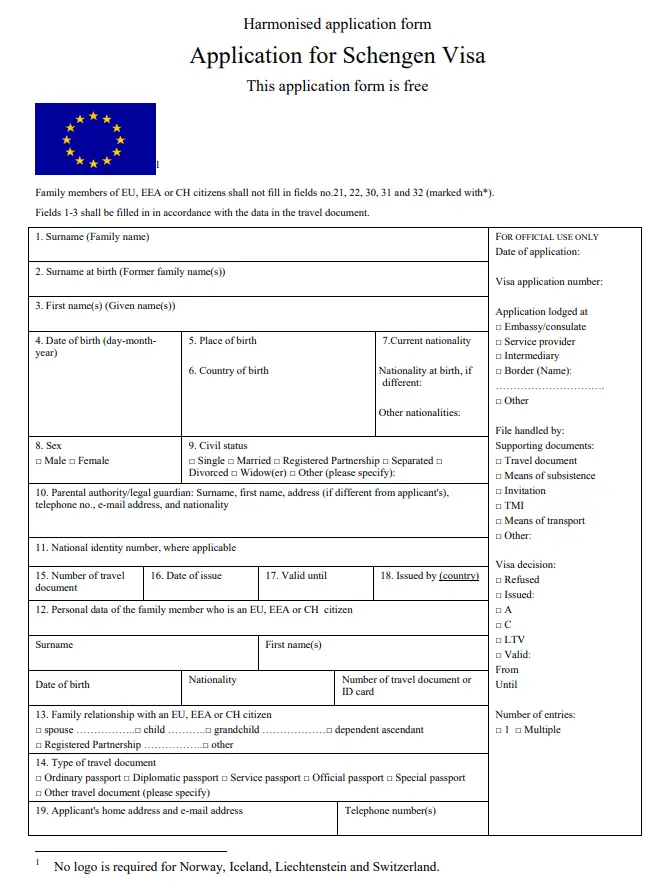
The Schengen Visa application form contains questions about you including:
- Name and surname
- Date and place of birth
- Nationality
- Sex and marital status
- National Identity number
- Passport number
- Home address and email
- Purpose of trip
- Question regarding previous trips to Schengen, if any
- Intended date of arrival in Schengen area you are visiting, and the intended period of stay
- Cost of traveling and remaining in Schengen area you are visiting, who will cover them, etc.
If you intend to travel for business purposes, i.e. visiting a business/company for meetings, recruitments, training or any other work-related activities, then you need to indicate Business the purpose of your travels.
Make sure your answers are correct and that they comply with the information in the rest of the documents. Complete the form, print it twice, and sign both copies at the end.
Find out more about how to complete a Schengen visa application form in this blog post.
Step 3: Prepare your documents
The following list of documents are required in order to obtain a visa to Iceland in the UK:
- A valid passport or Travel document. Please make sure:
- Your passport has been issued within the previous 10 years,
- Your passport has 2 full blank pages, one for the visa stamp and an additional spare page,
- Your passport will be valid for at least three (3) months after the date you exit the Schengen Area.
- Saudi nationals must produce their ID card with translation into English in addition to their passport.
- A valid UK residence permit or another form of Identity Card. The UK residency permit must be endorsed in the actual passport (or on a new biometric ID card)
- One application form filled out completely and signed by the applicant.
- One photo, which must be glued to the application form. Applications with stapled photographs will be rejected.
- Biometric data (this requirement only applies if you haven’t provided biometric data within the last 59 months):
- Fingerprints (Note: Children under the age of 12 are exempted from providing fingerprints)
- A copy of the passport bio page where the photo is included.
- A cover letter explaining the purpose of the visit to the Schengen area
- Proof of travel arrangements:
- Round trip flight/travel reservations or other proof of intended transport
- Complete itinerary of your visit to Iceland (if the several Schengen States will be visited or if the trip covers the several Schengen States and non-Schengen countries).
- Travel Insurance stating that you are covered in case of a medical emergency and repatriation not just in Iceland but in the whole Schengen zone (minimum coverage of € 30,000).
- Holders of diplomatic passports and family members of EU/EEA citizens are exempted from providing proof of travel medical insurance
- Proof of accommodation in Iceland:
- Evidence of a hotel booking or rental agreement, or
- Invitation from your Iceland host (family member, friend) with a copy of their passport
- Proof of financial subsistence :
- £60.00 per person per day if you are staying in a hotel.
- £40.00 per person per day if you are staying in a hostel or similar.
- £20.00 per person per day if you are staying with family or friends (even when your host has confirmed that he/she will be covering your expenses) plus funds for a return ticket to your country of residence.
- Original recent Bank Statement (covering the last 3 calendar months. The last transaction must be no more than 1 month old)
- Traveller’s Cheques
Note: Cash is not considered proof of financial subsistence.
Note: Photocopies of the original documents should also be submitted and documents should not be more than one month old.
The documents listed above are documents required in all cases, regardless of the purpose of your visit to Iceland.
Iceland Visa Requirements Based on Employment Status
Depending on your employment status, here is a list of additional documents that are required for your visa application:
For employees:
- Employment contract
- Current bank statement of the latest 6 months
- Leave permission from the employer
- Income Tax Return (ITR) form or Certificate of Income Tax deducted at the source of salary
For the self-employed:
- A copy of your business license
- Company bank statement of the latest 6 months
- Income Tax Return (ITR)
For foreign students in the UK:
- Proof of enrollment
- No-objection certificate from school or university
For retirees:
- Pension statement of the latest 6 months
If unemployed and married to an EU citizen:
- A recent (less than 3 months old) Confirmation of Employment letter from their spouse’s employer stating the position held within the company as well as the starting date,
- Spouse’s valid passport
- An officially translated marriage certificate. The translation must be in English or Danish and must be certified as a true copy by the Embassy of the country where the marriage took place or by the Legalization Bureau of the Foreign Office in the UK

Requirements for children under the age of 18:
Parents or an adult guardian are required to accompany their under-age children at the application centre at the Embassy of Iceland in London. Also, minors who are granted an Iceland visa are not allowed to travel to Iceland by themselves. They should be accompanied by an adult during their stay in Iceland.
Required documents for visa application for underage children:
- Birth certificate
- The Iceland application form should be signed by both parents.
- A family court order, in cases where only one parent has full custody over the child.
- Certified copies of ID/passport of both parents
- A notarized parental authorization to travel to Iceland, signed by both parents/guardians, if the minor will be travelling alone with another person.
All documents provided should be legalized and be in of the of the following languages:
- English
- Danish
Iceland Visa Requirements Regarding the Purpose of Travel
You will need to submit several additional documents, which prove the purpose of your trip to Iceland. Find the required documents for the most common purposes of travel to Iceland listed below.
Required documents for a Visa for Official Visit:
- The official invitation copy
- Evidence about the purpose of journey (meetings, consolations, negotiations etc.)
Required documents for a Medical Visa:
- A medical report from a doctor in your country of origin
- A medical attestation from the hospital in Iceland
- Proof of completed financial arrangements
Required documents for a Study Visa:
- Acceptance letter from the educational Institution.
- No objection letter from the educational institution where you are currently enrolled.

Required documents for a Visa for Cultural, Sports and Film Crews:
- Invitation letter from the relevant body in Iceland with details upon the nature of events or activities that are to be held in Iceland.
- Entry tickets to the event.
- Enrollment conditions.
- Detailed program of the event in Iceland.
Step 4: Attend your appointment
The visa interview is a meeting between you and the consular officer/interviewer. During this interview, the consular officer will ask you several questions about you and your intended trip. You will also be submitting the required documents throughout the meeting, to the interviewer.

You should pay attention to several things before and after the interview. First, show up on time at the appointment centre. Wear something comfortable, but presentable. Try to keep calm.
During the interview, answer each question that the interviewers ask. Do not provide extra unnecessary information to the interviewer. Smile time after time. At the end of the interview, thank the consular officer for their time.
Typical questions include:
- Have you ever travelled to the EU before?
- Are you meeting anyone in Iceland?
- What are you going to do in Iceland?
- Can you show me your bank statements?
- How will you pay for your trip?
Don’t jeopardize your Schengen visa interview at the last minute. Use this comprehensive and thorough visa interview guide to ace your visa interview!
Iceland Visa Fee
Since Iceland is a Schengen state, visa fees are the same as any other Schengen visa. These are the costs of an Iceland Schengen Visa when applying from the UK:
| Schengen Visa Category (by age) | Fee in UK Pound | Fee in Euro |
| Adult | 73 £ | 80 € |
| Child between 6-12 years of age | 36.5 £ | 40 € |
| Child younger than 6 years of age | Free | Free |
You will need to pay the fee either online if you are applying through a third-party company or in person during the interview.
Payments can be made in cash and by credit or debit card.
Step 5: Receive your visa
Visa application decision
There are two possible outcomes for your Iceland Schengen visa application:
- Approved – Once your visa is approved, it will be stamped in your passport. Make sure to carefully check the visa sticker to make sure everything is correct and exactly how you need it.
- Rejected – If your visa has been rejected, it would have been for a specific reason. You have the right to appeal.
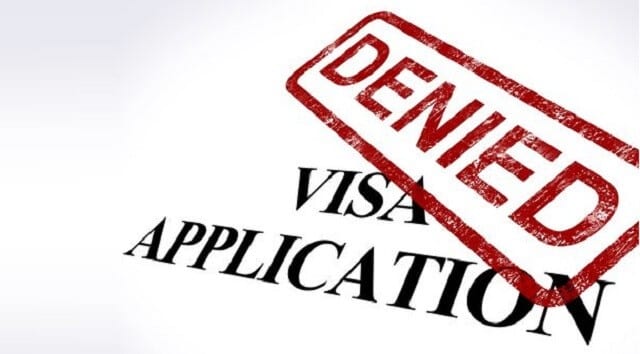
What are Common Iceland Schengen Visa Rejection Reasons?
There are several reasons why your Iceland Schengen visa application could be rejected. Some common Schengen visa rejection reasons include:
- Marriage certificate missing – if you are applying for a visa for family reasons, you may have to prove family ties. This is why you must provide a marriage certificate
- You applied for the wrong visa – it is your responsibility to apply for the correct visa depending on how long you are going to Iceland for and your reason for travelling there
- It is not clear that you plan to return to the UK – it must be clear that you intend to return to the UK before the visa expires. If the visa staff have doubts about this, your visa will be rejected
- The purpose of your trip cannot be established – the reason why you are planning to go to Iceland must be made clear. You can do this by providing specific documents like a full itinerary, work contract or invitation letter, etc.
What If My Iceland Schengen Visa Is Rejected?
If you receive a negative answer in your Iceland Schengen visa application, this does not mean you cannot ever travel to Iceland. In fact, you have two options.
- File an appeal for Iceland Schengen visa rejection if you believe that the decision to deny you a visa is unjust. You should have a strong basis for your complaint. You can appeal this decision by writing an appeal letter for an Iceland Schengen visa rejection.
- Reapply by correcting the mistakes you did in your previous application. Or improve your situation in order to comply with the eligibility criteria for an Iceland Schengen visa.
Temporary Iceland Visa Extension
The duration you are allowed to stay in Iceland is stated in your Schengen visa sticker. It is important not to overstay during your trip to Iceland or the rest of the Schengen Zone or you risk facing penalties like a fine, deportation, being banned from travelling back to the Schengen Zone, and having difficulties in your future Schengen applications.
However, there are also cases when people do not get any penalties for overstaying. For example, a child or a person that cannot travel without a caretaker because of an illness or disability or an unforeseen event that prevents you from leaving the country, like COVID-19.
An extension to an Iceland Schengen visa is only possible in exceptional cases where new facts and special reasons arise after entry into Iceland. i.e. if you show proof that you cannot leave Iceland because of force majeure or humanitarian reasons preventing you from leaving.
According to the Schengen visa policy, acceptable reasons to extend a Schengen short-stay visa are only the following:
Late Entry
You can base your visa extension application on this reason, only if you have a single-entry short-stay visa. However, this is your best case to extend your visa. You can apply for this visa extension if you have entered Schengen after your visa became valid. i.e. if your visa became valid on August 1, but you entered Schengen on August 15, you can apply for a two-week visa extension, and you are very likely to get it.
Humanitarian Reasons
The Schengen visa policy has made it possible to extend a short-stay Schengen visa to prevent or overcome hardship for third-country nationals. You will be granted a short-stay visa extension based on humanitarian reasons if you need to stay in one of the member states to continue receiving medical treatment, to take part in the funeral after the sudden death of a family member, to give support to a person close to you who is going through some kind of hardship, etc.
Force Majeure
If something unexpected has occurred all of the sudden in your home country before your visa expiration, as a conflict or war, or even violent protests across the country, extreme weather conditions, no flight connections because of consecutive earthquakes or other reasons, then you have a good chance to get a Schengen short-stay visa extension. You will be granted an extension of a few weeks, or until the situation in your home country changes. If the situation does not change, you will have to apply once again for a short-stay visa renewal, to remain in Schengen.
Important Personal Reasons
Risky, but you should still give it a try if you have no other chance. If you have some unfinished business in one of the Schengen Member States, an unplanned wedding (of yours or your relative), etc., then you may apply for the extension. The immigration authorities will then decide whether you should be granted a visa extension or not.

What is the Schengen Visa Extension Application Process?
If you wish to extend your visa and stay longer in the Schengen Zone, then start getting ready for your extension, which differs from a regular Schengen visa application.
The very first thing you have to do is decide under which reason you wish to apply for a Schengen visa renewal. After figuring that out, then you can proceed to the other steps.
When to Apply for a Short-Stay Visa Extension?
It is very important to apply on time, which is before the expiration of your visa. If you apply after your visa expires, even just a day later, then you will be deported for overstaying your visa, despite your reasons. Therefore, take care to apply at least a week before your current Schengen short-stay visa expires.
Where to Apply to Extend a Schengen Visa?
It depends on the Member State you are currently residing in. The main thing you have to know when it comes to the application country is that you will have to remain in that particular country until you get your visa extension if you do. That is why you are strongly advised to apply at the immigration authorities (or their equal) in the country where you need to remain, and not another.
What are the Schengen Visa Extension Requirements?
After you figure out the reasons which will be the basis of your application, where and when to apply, move to the other step, which is gathering the required documents. Unlike when collecting the Schengen visa required documents, for a visa extension, you need to submit quite fewer documents.
The list of documents you need when applying for a Schengen visa extension are as following:
- Passport, which must have the current visa under which you entered the Schengen
- Application form, for a short-stay Schengen visa extension
- One photo, which fulfills all the criteria and visa photo requirements.
- Proof of Income, which shows you can financially maintain yourself during the period you have applied to get a visa extension for
- Travel Health Insurance – that covers the whole Schengen Area as well as the whole period which you have applied to extend your visa for
- Documents, which prove your situation, and the need to get a visa extension
After you collect these documents, schedule an interview appointment online at the immigration authorities (or their equal). In some of the member states, you may not have to schedule an interview, however, try to check out if this applies to the country you are currently residing, or not.
If you need to schedule an interview, do it, and on the day of the interview show there on time with all of the required documents. The interview is crucial to get a visa extension, in the countries that apply it, since during it the interviewer will decide if you need to extend your visa and the reasons you have presented are true, or you are just trying to remain a little longer in the country.
What is the Processing Time for Visa Extension?
Usually, your visa extension application can take a few days, up to a month to be processed by the relevant authorities. During this time, you are permitted to remain in the country where you submitted your application even after your visa expires, but not to travel to the other Schengen countries.
If you are granted a visa you will be able to remain, while if you do not you will have one or two days to leave.
What is the Schengen Short-Stay Visa Extension Fee?
A Schengen visa extension fee is different from a normal Schengen visa fee, which you apply for before your trip towards the Schengen Area. Depending on the reasons for your application to extend your short-stay Schengen visa as well as if it is the first or second extension you are applying for, you may or may not have to pay a fee.
First Visa Extension Fee
If this is the first time you are applying for a Schengen short-stay visa extension, then you will not have to pay any fee if your application is based on the following reasons:
- humanitarian reasons
- majeure reasons
Whereas, you will have to pay a fee of 30 euros, if you have based your application in one of the following reasons:
- important personal reasons
- due to late entry
Second Visa Extension Fee
If you have already extended your visa once, but you need to extend it once again, for whatever reasons, then you will have to pay a fee. The cost of the second Schengen visa extension fee depends on the age of the applicant as follows:
- Minors need to pay a fee of 30 euros
- Adults have to pay a fee of 60 euros
Do not forget, that just as when applying for a regular Schengen visa, if your application is rejected, you will not get your money back.
Contact details for the Embassy of Denmark in London
Address: 55 Sloane Street, London, SW1X 9SR
Telephone: 020 7333 0200
Fax: 020 7333 0270
Email: [email protected]
Hours: Monday to Thursday, 9.00 am – 4.30 pm; Fridays, 9.00 am – 4.00 pm

Iceland Schengen Visa Frequently Asked Questions
Is an Iceland Schengen visa easy to get?
Yes, it is easy to apply for an Iceland Schengen visa. You can apply for the visa online or use immigration services like IAM to make the process even simpler for you and have a higher chance of your application being accepted.
Can I work in Iceland with a Schengen visa?
No, the Schengen visa is a permit for tourism, business or visiting family and friends. You will need to apply for a work permit to the Icelandic Directorate of Immigration if you intend to work in Iceland.
Can I enter other Schengen countries with an Iceland Schengen visa?
Yes! The Schengen visa is valid in all Schengen countries and 18 other countries.
How can I get Iceland Schengen visa fast?
You can get a premium Schengen visa to get your Iceland Schengen visa within 24 to 48 hours, which includes personalised advice from an expert immigration adviser.
How much bank balance is required for an Iceland Schengen visa?
It depends on how long your trip is. You will need to prove to the Embassy that you have at least 28.83€/day.
What is the best currency to take to Iceland?
Although Iceland is part of the Schengen Area, the country's official currency is the ISK or Icelandic króna. Euro/Mastercard and Visa credit and debit cards are also widely used in the country.
So, are you ready to make your Schengen visa application for Iceland? Comment below.
IaM can help with your visa application to the United States, the UK & other countries
If you need help with a US visa, a UK Visa, or visa to Europe, including help with appointment booking obligations, IaM can help. For more information and advice on US immigration, UK immigration law and US visa applications or if you need any help or assistance please, reach out to your Visa Coordinator at IaM.
- How to Apply for an Estonia Schengen Visa from the UK - 27 December 2021
- How to Apply for a Netherlands Schengen Visa from the UK - 20 December 2021
- How to Apply for a Czech Republic Schengen Visa from the UK - 13 December 2021
